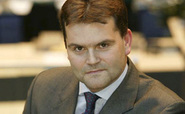
© Jeremy Stretch
|
Recently the head of Eurogroup Jean Claude Juncker said that the Euro foreign-exchange rate is dangerously high. Do you agree that Euro's recent advance versus the U.S. Dollar can be a threat to the Eurozone's economy?Clearly an appreciating exchange rate is another headwind for Europe, which certainly the periphery of Europe would rather not have. However, I think it is not necessarily the most notable factor. To my mind, it is the case that we will see some further short-term support for the Euro, and we may as well find that the Euro potentially gets back to 1.35. Nevertheless, I think that the rally we are seeing in Europe at the moment will be relatively short lived. The weakness that we continue to see in the fundamental data even before the impact of this current advance in the Euro will come back to the forefront as we go through later on into the first quarter and beginning of the second quarter. Thus, I believe that the Euro's rally will be rather short-lived. And whilst Jean Claude Juncker's comments are clearly a sign that some of the politicians are worried, the ECB are not too concerned as yet. I think that some of those political fears will be limited as we would expect a reversal in the Euro strength as we reach the end of the Q1 and the start of Q2.
Do you expect the Euro to go higher above the current level?
I think it will go a little higher. The highs of the last year just shy of 1.35 are clearly realistic targets in the short term. If you look at what has happened in the Euro over the course of couple of years, there are some pretty good levels of resistance and trigger points around that 2012 high just nearly reaching 1.35. Thus, I assume that is a likely target for the market in the near term. However, as I said the fundamental story in Europe is still rather seriously compromised. I think markets have obviously taken their eyes off economic fundamentals and weakness of them in Europe and refocused somewhat on both: the movement in the Yen, but also in terms of U.S debt ceiling or fiscal cliff issues. However, I think once we come back to focus little more on domestic considerations in Europe that will limit the gain and so that's the upper 1.34 area just shy of 1.35 will prove to be the top.
What do you think is sustainable level or fair value for EUR/USD?
For the whole Eurozone, I would probably say that a fair value of EUR/USD is probably around the 1.23 mark. Nevertheless, if we look at individual nations and their different component parts, then German's fair value level would be probably somewhere higher than we are now or somewhere not too far away; whereas, the other weaker peripheral countries would probably find a fair value level of somewhere closer to parity or under 1.10. It is a difficult question, but I think we are probably in moderately overvalued territory compared to the Eurozone wide level. Hence, clearly if we were to see a number of 1.35 in to the upper 1.30eis then that would seriously start to even have an impact in Germany. Moreover, I think that would be even more damaging for growth story over the medium term.
What is your forecast for EUR/USD for the end of January and end of the quarter?
Our target for the end of January is 1.3485 area. For the end of the quarter though, I expect that we will see a reversal, thus I think we will probably looking back at around 1.30 level and continuing to trim down for the rest of the year.